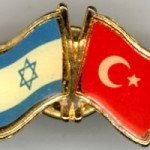Saturday
Oct312009
An Israeli Snub to "Very Valuable" Turkey?
 Saturday, October 31, 2009 at 8:23
Saturday, October 31, 2009 at 8:23
Israel and Syria: Can Turkey Be a Mediator?
Receive our latest updates by email or RSS SUBSCRIBE TO OUR FEED
Buy Us A Cup of Coffee? Help Enduring America Expand Its Coverage and Analysis
 Maybe it's because Israeli leaders had a busy day on Thursday --- debating Palestine, considering the economy, getting their hair done --- but I can't help thinking that this may be a snub. At Turkey's Republic Day reception in Israel, Binyamin Ben-Eliezer, the Industry, Trade and Labor Minister, was the only Israeli politician to be found. President Shimon Peres, Prime Minister Benyamin Netanyahu, Foreign Minister Avigdor Lieberman, and Deputy Foreign Minister Danny Ayalon all declined their invitations.
Maybe it's because Israeli leaders had a busy day on Thursday --- debating Palestine, considering the economy, getting their hair done --- but I can't help thinking that this may be a snub. At Turkey's Republic Day reception in Israel, Binyamin Ben-Eliezer, the Industry, Trade and Labor Minister, was the only Israeli politician to be found. President Shimon Peres, Prime Minister Benyamin Netanyahu, Foreign Minister Avigdor Lieberman, and Deputy Foreign Minister Danny Ayalon all declined their invitations.
Asked whether this was a form of protest, a spokesman for Peres said she had nothing to add. Lieberman's spokesman stated only that the Foreign Minister would not attend and did not give any detail. A spokesman for Netanyahu said the prime minister had other obligations Thursday night. A spokeswoman for Ayalon said on Wednesday that he was not able to attend due to "scheduling problems".
Ben-Eliezer did speak at the reception on the "very valuable" Israeli-Turkish relationship and said that it was a "great privilege to be here to today with good friends and to commemorate the 86th Republic Day of Turkey". Then he added, "Both [Israel and Turkey] cooperate strategically - we must make the utmost of efforts to put the train of our friendship back on track."
Receive our latest updates by email or RSS SUBSCRIBE TO OUR FEED
Buy Us A Cup of Coffee? Help Enduring America Expand Its Coverage and Analysis
 Maybe it's because Israeli leaders had a busy day on Thursday --- debating Palestine, considering the economy, getting their hair done --- but I can't help thinking that this may be a snub. At Turkey's Republic Day reception in Israel, Binyamin Ben-Eliezer, the Industry, Trade and Labor Minister, was the only Israeli politician to be found. President Shimon Peres, Prime Minister Benyamin Netanyahu, Foreign Minister Avigdor Lieberman, and Deputy Foreign Minister Danny Ayalon all declined their invitations.
Maybe it's because Israeli leaders had a busy day on Thursday --- debating Palestine, considering the economy, getting their hair done --- but I can't help thinking that this may be a snub. At Turkey's Republic Day reception in Israel, Binyamin Ben-Eliezer, the Industry, Trade and Labor Minister, was the only Israeli politician to be found. President Shimon Peres, Prime Minister Benyamin Netanyahu, Foreign Minister Avigdor Lieberman, and Deputy Foreign Minister Danny Ayalon all declined their invitations.Asked whether this was a form of protest, a spokesman for Peres said she had nothing to add. Lieberman's spokesman stated only that the Foreign Minister would not attend and did not give any detail. A spokesman for Netanyahu said the prime minister had other obligations Thursday night. A spokeswoman for Ayalon said on Wednesday that he was not able to attend due to "scheduling problems".
Ben-Eliezer did speak at the reception on the "very valuable" Israeli-Turkish relationship and said that it was a "great privilege to be here to today with good friends and to commemorate the 86th Republic Day of Turkey". Then he added, "Both [Israel and Turkey] cooperate strategically - we must make the utmost of efforts to put the train of our friendship back on track."

 On Friday,
On Friday,  On Thursday,
On Thursday,